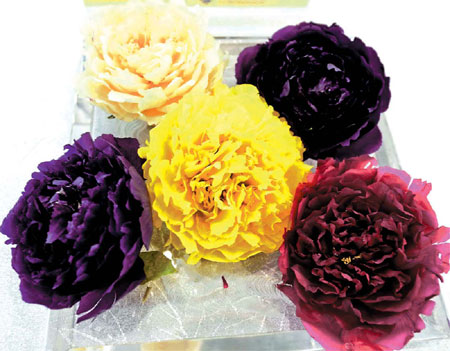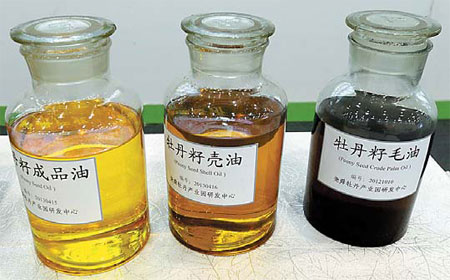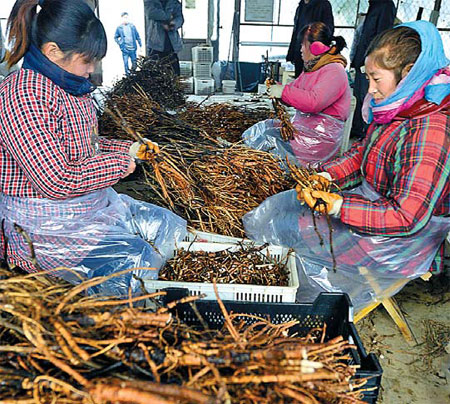The peony's blossoming business
Updated: 2014-01-01 07:16
By Zhao Ruixue (China Daily)
|
||||||||
Famed flower is now used to make top-quality cooking oil, cosmetics and herbal medicine, Zhao Ruixue reports from Heze, Shandong.
Seven months ago Li Hao closed his lucrative business in Beijing and returned to his hometown of Heze in Shandong province to run a new company that makes products known to very few people.
Now in his 40s, Li has turned from oil drilling technologies to the peony business.
"I didn't know that a flower can be made into so many varieties of unique products before they (local officials) came to me," says Li. "Nine out of 10 of my friends are as ignorant about peony-related products as I was."
Li organized a peony group using the social media QQ that now has some 200 members, most of them white-collar workers. He usually consults them when he wants to know if a product has market potential.
"The oil distilled from peony seeds could be a revolution in high-end cooking oil across the world," says Li. That prospect was why he took the job as general manager of Heze Yao and Shun Peony Biotechnology Co, which was founded in 2011 at the urging of the local government.
After two years, the company has developed seven products from the peony flower and plant.
"Every single part of the peony is a treasure," says Li.
Peony seeds are used to make cooking oil, and petal extracts are used in cosmetics, perfume and essential oil. Pistils are made into a tea and the root is considered a good Chinese herbal medicine.
The products impressed Chinese President Xi Jinping, who paid a visit to the company's exhibition hall during his tour to Shandong in November.
President Xi said his knowledge about the peony was enriched after spending around 40 minutes viewing the products showcased in the exhibition hall, recalls Zhang Guibin, who introduced the peony products to him.
"President Xi was particularly fascinated by peony seed oil," says Zhang.
As the deputy director of the city's district of Mudan - which actually means peony - Zhang is regarded as an expert on the flower.
"Peony seed oil contains a lot of alpha-linolenic acid, which is very helpful to brain cells and can significantly reduce both anxiety and stress," says Zhang. It belongs to the same family as omega-3 fatty acid extracted from fish oil.
Supported by technologies from Beijing Forestry University, the Chinese Academy of Forestry and the State Forestry Administration, technicians in Heze began to study peony seed oil in 2003. Completed in a lab at the Chinese Academy of Forestry in 2006, the results showed peony seed oil is composed of 43.18 percent alpha-linolenic acid, a content 61 times higher than olive oil and six times more than soybean oil.
In 2011, peony seed oil was recognized as a new food resource in a statement from the Ministry of Health.
"The peony seed oil industry will help maintain grain and oil safety," says Li Yucai, head of the China Forestry Economy Society. China bought 5.98 million tons of vegetable oil in overseas markets in the first three quarters of 2013, a year-on-year increase of 9 percent, according to the General Administration of Customs.
Each Chinese resident consumed an average of 18.5 kg of oil in 2012, an increase of 7.5 kg over 2001. The China National Grain and Oils Information Center forecasts the figure will reach 23 kg between 2017 and 2022 as living standards continue to rise.
In addition to containing richer nutrients than the soybeans widely used in China for cooking oil, peony seeds produce more oil.
"The oil from one mu (0.07 hectare) of peony cultivation is 3.4 times more than that from soybeans," says Zhang. "And the peony is generally hearty and requires little care. In China, 24 provinces are suitable for planting peonies."
To capitalize on the bright prospects, local governments in China began planting more peonies in 2011.
By the end of last year, a combined 20,000 hectares in Shandong, Henan, Hubei, Gansu, Chongqing and Anhui were growing peonies for cooking oil. They are expected to produce 57.85 million kg of seeds in 2017 when they begin to produce seeds, according to statistics from Mudan district.
Gansu has released a plan to develop 69,330 hectares for oil-oriented peony cultivation by 2020. Shandong plans to develop 533,300 hectares by 2020.
As a pilot area for developing peony seed oil supported by the Chinese Academy of Forestry, Heze planted 18,000 hectares this year, 62 percent of the city's total. The figure is expected to reach 133,330 hectares in 2020.
Nine companies in the country now have a total annual production capacity of 15.87 million kg.
But due to the shortage of seeds and low demand, their production this year fell far short of that.
Heze Yao has the world's largest production line, able to produce up to 10 million kg, yet the company only produced 200,000 kg this year.
And due to low output, the price for the peony oil is high.
A 275 ml bottle of peony seed oil produced by Li's company sells at 1,000 yuan ($165). Their products are now on sale in metropolises such as Beijing and Shanghai.
"Our production this year is short of demand," says Chen Limin, deputy general manager at Heze Yao. "Some people already know the value. It can be used in not only for cooking and healthcare, but also in cosmetics."
Experts say the price will be reduced to 300 to 400 yuan per kg by 2020.
"The peony usually takes four to five years to produce seeds. So oil output will be greatly raised when those planted begin to produce," says Chen Xuexiang, director of the management office of the national peony hi-tech industry base in Heze. Heze also grows 90 percent of the peonies used in landscaping, says Zhang.
Horticulturists in the city cultivate 1,237 varieties of peony that are used in more than 100 cities in China and some 20 countries including France, Canada, Netherlands and Belgium.
Peony paintings of the flower known as the fuguihua, or the blossom of riches and honor, sell well.
Hundreds of artists in Heze are involved in painting peonies. "We hope the peony industry blooms across our country. We are glad to see more people benefit from the quality products," says Zhang.
Contact the writer through zhaoruixue@chinadaily.com.cn

|
The oil distilled from peony seeds could be a revolution in high-end cooking oil across the world. Photo / Ju Chuanjiang |
|
Workers sort peony roots to be used in herbal medicine. |
(China Daily 01/01/2014 page7)

 US First Family out for shave ice in Hawaii
US First Family out for shave ice in Hawaii
 New Year's Eve celebrations in Times Square
New Year's Eve celebrations in Times Square
 Revellers embrace the New Year at Great Wall
Revellers embrace the New Year at Great Wall
 Israel frees 26 Palestinian prisoners
Israel frees 26 Palestinian prisoners
 Gen Y's motto: Show me the money
Gen Y's motto: Show me the money
 Sacred mountain of wonders
Sacred mountain of wonders
 Schumacher 'slightly better' after 2nd operation
Schumacher 'slightly better' after 2nd operation
 IOC boss expects 'safe' Sochi Games
IOC boss expects 'safe' Sochi Games
Most Viewed
Editor's Picks

|

|

|

|

|

|
Today's Top News
DPRK leader calls for better ties with ROK
China ready to further advance ties with US
China to promote cultural soft power
US consumer mood brightens
China suspends Pfizer imports
Cities offer 72-hour visa-free stays
Utah to suspend gay marriage
Ringing in the New Year Chinese style
US Weekly

|

|










